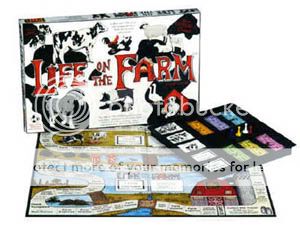
My family really loves games. We already own a lot of games, but I am always looking for new ones for us to enjoy together. That’s why I was really excited when I found out I would be receiving Life on the Farm to review. Not being able to resist a new game, my daughter immediately opened the package and got to work setting everything up so we could play that afternoon!
 The first thing I noticed was how nice the box is. The cardboard is definitely heavier than most. The board itself is also very sturdy and attractive. The contents include the game board, dice, pawns for 6 players, money, cow cards, income cards, and expense cards. I appreciate the organizer to hold the money and cow cards to keep them from becoming a mess.
The first thing I noticed was how nice the box is. The cardboard is definitely heavier than most. The board itself is also very sturdy and attractive. The contents include the game board, dice, pawns for 6 players, money, cow cards, income cards, and expense cards. I appreciate the organizer to hold the money and cow cards to keep them from becoming a mess.
Life on the Farm is a board game that is based on…you guessed it…Farming. The concept of the game is straightforward. The players roll the dice and move their pawns around the board. The squares display instructions. For example, there is a space that says you’ve sold a bull and to collect money. There are some spaces that instruct you to draw an income or expense card. These cards have different situations that can arise on a farm that either make money or cost money. I am a lifetime suburbanite, so my knowledge of farming has been confined to books and an isolated field trip or two. The game introduced me to some of the ups and downs of farming.
The object of the game is to be the first player to acquire both 60 cows and $10,000 (That’s the amount of money each player starts with.) There is also a suggested shorter method. We learned rather quickly that it isn’t wise to be too conservative with buying cows at the beginning of the game. Although many of your expenses are based on the number of cows you own, your main income (every time around the board, like Monopoly) is also based on the number of cows you own. So more cows means you make more money, more quickly. Another reason to buy larger quantities of cows at once is there are limited opportunities to purchase cows. You can only purchase cows when you land on a cattle auction space on the board (and there aren’t that many) or draw an expense card allowing you to purchase cows. So, getting to 60 cows takes a LONG time if you only buy a few at a time.
So, what did we think of the game? My 9 year old daughter liked it a lot. My 11 year old son thought it was ok. I found it to be fun (especially since I won, finally), but it takes more time that I usually have to spend on a game. (We will be playing the shortened version next time.) I know that I would have loved this game as a child, but it’s not my favorite type of game as an adult. Now, I tend to prefer card games or strategy games. But, I think Life on the Farm makes a good family game. Many of the games we play leave little opportunity for the children to win. Life on the Farm is not a game of total chance because there is some strategy about buying cows, but the player doesn’t have control over what happens to him as he moves around the board. That is an equalizer that makes it good for multi-ages to play. There is also opportunity for addition practice (rolling dice), multiplication practice (most of the income and expense cards require rolling one of the die and multiplying the roll by 10), and practice with money. With the math practice and the farm information, it’s educational in a sneaky sort of way.
Life on the Farm is available from We R Fun for $25. You can also find it at Amazon.com for $29.99 and Kmart.com for $19.99. To read more reviews of Life on the Farm, visit the Homeschool Crew blog.


Disclosure: This product was provided to our family for free as members of the 2009-2010 Old Schoolhouse Magazine Homeschool Crew. Reviews and opinions expressed in this blog are our own.

I adore the IDEA behind this game. One of my passions is supporting local agriculture. I know you said this is a good family game, but what age group would you say the game is "designed for"?
The ages of the game are listed from 8-108 🙂 The game is not childish at all. Whether teens and adults like the game would be more dependent on what type of game they enjoy. I have found that with any game, a lot depends on the attitude of those playing and that the same game that is hilarious with one group of people will be a real drag if played where someone complains. Life on the Farm leans more toward chance than strategy. It has some similarities to Monopoly, but is also very different.
HTH